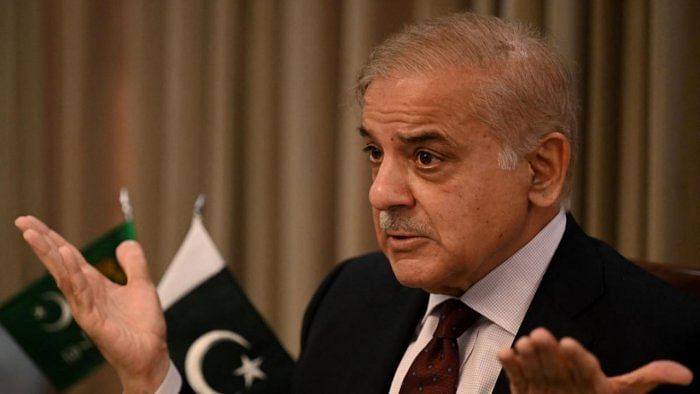
Pakistan's Prime Minister Shehbaz Sharif on Saturday disclosed that Army Chief General Asim Munir played a role in securing funds from Saudi Arabia and the UAE -- a pre-condition by the IMF to seal a bailout deal with the cash-strapped nation.
Addressing a ceremony in Lahore here, Sharif also expressed hope that now the IMF will not delay in reaching an agreement for $1.1 billion sought by Pakistan as the Pakistan Muslim League-Nawaz led coalition government has made a lot of efforts to fulfill the IMF demands.
"Chief of Army Staff General Asim Munir has contributed to the government's efforts to secure funds from Saudi Arabia and the UAE," Sharif said.
Debt-ridden Pakistan and the IMF have failed to reach a staff-level agreement on the much-needed USD 1.1 billion bailout package aimed at preventing the country from going bankrupt.
The funds are part of a $6.5 billion bailout package the IMF approved in 2019, which analysts say is critical if Pakistan is to avoid defaulting on external debt obligations.
Earlier, the Pakistani Army had announced that Gen. Munir has no role in politics while Pakistan Tehreek-e-Insaf (PTI) chief Imran Khan still maintains that the ultimate power in the country's politics rests with the Army chief.
The premier said that after securing funds/loans, Pakistan has now met all “tough conditions" of the IMF for the staff-level agreement.
Hopefully the IMF will now have no excuse to delay the agreement (to release a tranche of USD 1.1 billion)," he said.
"The nation would have to decide whether it would depend on foreign debts or want to stand on its feet by carving a niche among the comity of nations with honesty, dedication and hard work," Sharif said.
"Pakistan was not created to run on debts and act like beggars because their forefathers and different generations had given sacrifices for the motherland,” he said.
Sharif said the IMF had sought bilateral financial support from friendly nations before the staff-level agreement.
"Realising our problems, China provided a rollover of $2 billion loan, besides returning back the previous debt amount paid back by Pakistan. The UAE had committed a loan of $3 billion," he said.
"Such tough conditions were set which weren’t easy for Pakistan to fulfil,” the prime minister said.
His remarks came as it emerged that Pakistan still needed $3 billion to bridge the $6 billion financing gap during the current fiscal year ending June.
Quoting highly placed sources, The Express Tribune newspaper reported that the IMF was seeking confirmation for the total $ 6 billion loans that Pakistan urgently needs to bridge the external financing gap.
They said that the government was trying hard to secure commitments for the rest of the $3 billion by next week, the report said.
The country has secured a commitment from Saudi Arabia to provide $2 billion and the UAE to give $1 billion but it is not enough.
Four days ago, Finance Minister Ishaq Dar had requested the IMF to show some flexibility and strike a staff-level deal, which according to him can pave the way for arranging the rest of the loans.
But the IMF identified the $6 billion hole in Pakistan’s external financing requirement, which it asked to be bridged before the matter is taken to the IMF’s board for approval of the next loan tranche.
Pakistan still might take some time to arrange the rest of the loans. The government has mentioned loans from foreign commercial banks as one of the sources to bridge the gap.
However, the finance ministry officials said that it will take four to six weeks for negotiations and then the disbursement of the foreign commercial loans, adding if these foreign commercial banks just give an assurance to the IMF, it will be sufficient to strike a deal, the report said.
Foreign banks are reluctant to extend any fresh financing due to the junk credit rating of Pakistan.
Meanwhile, Nathan Porter, IMF Mission Chief to Pakistan, said that the global lender “looks forward to obtaining the necessary financing assurances as soon as possible to pave the way for the successful completion of the 9th EFF (Extended Fund Facility) review”.
Porter welcomed “the recent announcement of important financial support to Pakistan from key bilateral partners”, implicitly confirming the UAE and Saudi Arabian commitments. But these commitments are short of the requirements of Pakistan.
He said that the lender was supporting Pakistan’s efforts to arrange the loans.